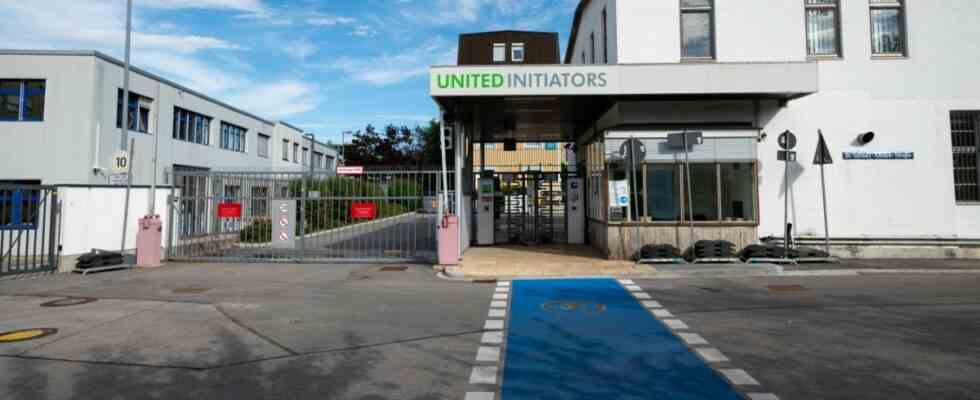An officially unconfirmed report about the sale of United Initiators provides grist to the mill of critics who want to stop expansion plans. Equistone Partners Europe, the owner of the chemical plant, is said to want to sell it again six years after the takeover in 2016. The company is silent on this, but does not deny it either. “United Initiators wants to decorate the bride,” says Christian Boeck, spokesman for the citizens’ initiative “Protection of the Isar Valley,” the company.
Meanwhile, it is still questionable whether the construction management process for the conversion and expansion plans will clear the last hurdle in the July meeting of the municipal council. Since Friday, the content of the eagerly awaited urban development contract between the municipality and the company has been on the homepage of the Pullach town hall, some of it blacked out. The contract, it can already be said, does not help to appease the critics of the project running under “Big Wings”. The promises made by United Initiators are “too vague, too non-binding,” complains Peter Kloeber, spokesman for the Pullach agenda.
The fact that there will be a resolution at all in the municipal council at the end of July depends essentially on whether the committee declares the citizens’ initiative against the expansion plans permissible this time after it had voted against it last year and the administrative court and the Bavarian Administrative Court had gotten right with formal legal justifications. Boeck and a comrade-in-arms have now reformulated the question of the request, which was objected to by the court, submitted a signature list with 773 signers in the town hall on Wednesday and thus probably reached the quorum of 700.
In the event that the citizens’ petition is approved, she will propose a council request in parallel, said Mayor Susanna Millennium (Greens). If the majority voted against admission, the applicants would be given a window of opportunity to have the decision reviewed by a court. “Don’t panic, we will not violate the rights of a citizens’ petition and will not create a fait accompli,” said the mayor. A proposal for a resolution will be formulated in the coming week on the question of the admissibility of the citizens’ request.
Photovoltaics on the roof arouse concern
“Our tendency is clear: against a hasty decision and for taking the citizen seriously,” said Christine Eisenmann (CSU), whose parliamentary colleagues also see it. What she receives on the streets is that the topic is occupying all of Pullach, across all social classes and partisan views. As with the first citizens’ initiative, the CSU will vote in favor of acceptance in the municipal council, as will the two FDP representatives. “The point is that the citizens have to decide,” said Alexander Betz, who doesn’t really like the town planning contract. “It only contains non-binding information, and it was clear what was binding anyway,” says the Free Democrat. Reinhard Vennekold from the four-strong WIP group was also disappointed in one essential point.
He would have liked United Initiators to make more concessions on the energy issue, he expects a large industrial company to be willing to make more compromises, especially in today’s world. And he still doesn’t see the photovoltaic systems on the company’s roofs, which are regulated in the urban planning contract. “I don’t think that’s possible under fire protection law on the roof of a highly explosive chemical plant,” said Vennekold. From his parliamentary group, only he and Angelika Metz had agreed to the first citizens’ initiative, but it remains to be seen whether Cornelia Zechmeister and Johannes Schuster will now vote for the changed question. Caroline Voit from the Pullach plus parliamentary group also left an answer to this question open.
According to his own words, Holger Ptacek from the SPD also hoped that several points would be regulated in the contract. But if this were rejected, then everything would be dealt with according to the old development plan from 1995, and then the municipality would no longer have any influence. “The question is whether we should throw the sausage at the bacon side,” he said, dismissing fears that a sale of United Initiators could render all deals null and void. A sale would not affect the development plan process, “it’s about the company, who owns it doesn’t matter”.
Agenda spokesman Peter Kloeber complained about “highly unclear formulations” and above all the lack of concrete and binding agreements on quantity restrictions in production and on switching to renewable energies and rail in the urban development contract. So there is not a word about the preservation of the 18,000 square meter forest area in the south of the plant, not a word about shifting the transport of hazardous substances to rail.
Characteristic of an urban development contract (SBV), as negotiated by the municipality of Pullach and United Initiators (UI), is usually the willingness of a – mostly private – investor to assume the costs for certain urban development projects in order to receive a Municipality to get building rights, for example by drawing up a development plan. The Pullach treaty contains, among other things, specifications for the protection of nature, species and the environment as well as measures for transport and energy generation. The UI has undertaken to “impose the obligations and obligations assumed in this contract on its respective legal successor in ownership of the areas located in the planning area – each with a transfer obligation”, the municipality announced.

